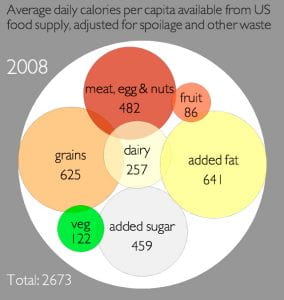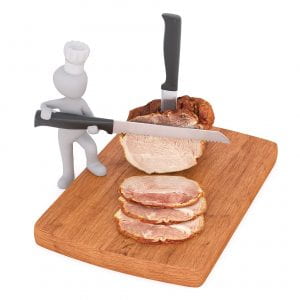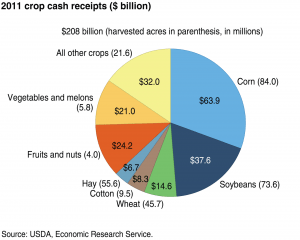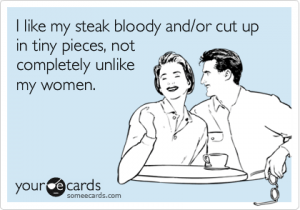This image speaks volumes on how humans view animals and their diets. For me, I see a singular human entity cooking food for who I presume is himself. Although he is not very big, he is cutting himself many portions of strict meat to feed himself. There is no other food or people present; he has prepared the meal and will eat it all by himself. But instead of proper proportioning, and balancing it with other food groups, he eats a whole large meal of just meat. Western diets especially have begun to become extremely processed food-based and meat-centric. Usually, the center point of the dish is the meat and meat are served at almost every meal. I think the reasoning behind making the image above such a focal point of the lesson is demonstration two things found in western cultures; first, this idea off meat being the center point of diets and two the overindulgence that reoccurs in our culture. In many other countries, the vegetables, fruits, starches, leafy greens, various carbohydrates make up the large portion of the meal with a smaller serving of meat to complement.
Looking at this image below shows how much Americans and other westerns are moving away from vegetables and other foods are grown from the ground and towards more processed and meat-based diets. Fruits and vegetables make up a very underwhelming portion of the diet compared to meats eggs and nuts, and this image also raises a lot of concerns about the number of processed sugars, added fats, and types of gains (bleach flour is often considered unhealthy) we consume. Most of these are not only negatively impact our bodies and metabolisms, but the way they harvest can also have a negative implication on the environment as well. Excess livestock, who are often overfed gain and corn seed to fatten them up for consumption, can be extremely detrimental for the environment because of the amount of water used to raise them and the methane gas released into the air from them is a natural greenhouse gas. The problem with the food we provided of them being mainly grain and cornmeal is how we produce the plants for not only the animals but ourselves as well. Extensive mono-cropping agriculture persists in the US and is a source of land degradation, overuse of pesticides, fertilizer, and water, a decrease in biodiversity. We have wiped out a large portion of natural wilderness for cash crops, large areas of monocropping, and cattle raising.

Philpott, Tom. “The American Diet in One Chart, with Lots of Fats and Sugars.” Grist, Grist, 6 Apr. 2011, grist.org/industrial-agriculture/2011-04-05-american-diet-one-chart-lots-of-fats-sugars/.
The image from this lesson shows several factors that are important to the ecofeminist movement. First, how the way we are eating now is not only unsustainable but bad for the environment. We are abusing the land, which is a significant negative for any green party affiliate. Second, the dominating and oppressing nature in which we interact with our livestock is often thought of as inhuman and is dominating in nature. This oppression directly contradicts most of the ecofeminist ideals. Third, the general overindulgence of our eating habits in America shows the lack of care we have for not only the environment but our fellow man, with many people in our own country underfeed while we overfill plates daily. Lastly, the idea of practicing a well-balanced, non-harming, healthier lifestyle seems to follow suit with many ecofeminist ideas, which I believe is a message this image could be conveying.
I believe that a lot of this idea of gendered food stems originally from the days where men would hunt for meals, meat was harder to come by and dangerous to get. But we have moved away from that idea a long time ago, in today’s society it is misconception often perpetuated by mass media and uninformed individuals, Zoe Eisenberg states ““Backed up by the entertainment industry is the idea that the bloodier the steak, the more manly the man, the same way it once was with the man smoking cigarettes.” A lifelong vegan (meaning his parents raised him that way), Howell says he has never felt his manhood was under siege when others learn he eats no meat—other than the typical scrutinization he gets for being vegan in general.”. Many industries and people believed that eating meat made you stronger and more mainly. There was some evidence to support the matter if you thought of eating meat for protein to build muscle, something more “manly” men had. While eating meat can be a source of protein, a part of a balanced diet, it is something both men and women need and can be obtained from various nonanimal products. For a long time, culture pushed men to be more aggressive, violent, demanding, and ruthless. A man survived in a kill or be killed world, and nothing quite showed victory like eating a kill. This stereotype of an expectation of aggression and violence in men is continually pushed throughout much of human history. Where we land today, in modern society where hunting is an almost obsolete skill, our knowledge of the human diet has made leaps and bounds, our understanding of men and women, a shift in the need for both genders, and an overall change in culture and the way we live our everyday life. But men are still being pitched the same stereotype, the idea of eating another animal that has been conquered by man is not only the best and only way to get protein but is a masculine thing to do. All of which has not been shown to be true, but the idea is constantly portrayed in our everyday culture, perpetuated by misinformation, and halted by society’s scrutiny of anything different and or progressive that slows the rate at which people attempt to change. Men feel a sense of subconscious pleasure from eating the flesh of another animal, a connection to evolutionary roots, a connection to the need to oppress and feel like a dominant hunter.
A similar pattern and idea can be recognized in societal pressure for women to eat salads. First, women primarily began as gathers of fruits and vegetables, and have been traditionally known for being closure to nature. But the societal pressure I believe build from two stereotypes pushed in modern media women are weak and dainty, like a leafy green therefore should eat like such. The other is that all women must be skinny and thing, which is associated with eating salad. Salad can be an extremely healthy option for most people, but the idea of eating a salad is often projected as feminine. Women are attempted to look soft less menacing, like a salad, nothing has to be dominated and killed in order to obtain the meal. To be healthy and to be thin is to eat salads every day, to be thin is an expectation men force upon women, so to eat a salad is something women should do according to reason and modern society.
“One clear way of distinguishing the two approaches is that whereas the rights approach is not inherently contextual[1] (it is the response to the rights of all sentient beings), the caring-for approach responds to particular contexts and histories. It recognizes that the reasons for moral vegetarianism may differ by locale, by gender, as well as by class.” (Curitin, 1991). Ecofeminism is mainly supposed to encompass a level of respect for not only all people but the entire natural world. It is about having respect for thous neighbors and the birds’ overhead. The idea the vegetarianism is not only more human because no life form is killed in the process, but also because of the ecological benefits that a predominately vegetarian diet comes with. Curtin goes on to explain how the idea of moral veganism falls into the ecofeminists because of the moral obligation they feel to protect living things. They feel guilty about taking other things life away for their own personal gain, especially when they can thrive without it. Curtin explain how ecofeminists feel a sense of respect toward animals and killing them would completely go against that respect. But in another sense, there is a strong connection between vegetarianism and sustainable lifestyles. Since eating raised meat and livestock has a negative implication on the environment an ecofeminist, according to Curtin, would support the movement as well because if their moral obligation to the Earth. Gaard points out that eating meat and forcing livestock to live as they do is oppressive in itself. This is exactly the type of oppressive nature that ecofeminism aims to eliminate and counter, so eating meat would be supporting these industries that oppress.




A lot of this assignment was thinking about how we relate ourselves to animals to consider our relationship toward food, but what if we flipped that perspective to think about plants? I think the discussion would still support veganism in a similar way to what we discussed about meats. In your blog you say “First, women primarily began as gathers of fruits and vegetables, and have been traditionally known for being closer to nature.” and I think this is exactly why veganism can look appealing from the plant perspective. Growing plants and uniting with nature allows our bond with nature to grow and expand. Similar to animals, it’s important to consider ethics surrounding the production of both meat and plant based foods. Growing plants needs to be done naturally, similar to the way we think about growing animals, and that allows us to have a positive relationship with the foods we eat. Moral veganism would allow for the consumption of meat if it was ethical, so why would we stop for unethical plant growth? Even these practices of caring to these types of food are gendered, as traditional butchers are masculine men, and women are seen to tend to crops. You also talked a lot about diets, and food is always a very difficult thing for people to manage, but perhaps with a more moral approach to food, a diet change will happen naturally.
I really liked your interpretation of the image provided! Taking a second glance at it, I can see where you’re coming from. Bringing up the comparison between the usual diet here and diets in other parts of the world is very interesting to me. I’m going to Sweden during our upcoming vacation and I think I’m going to think ling and hard about the differences in food choice when it comes to how me and my Swedish friends eat. One of the isn’t particularly the biggest fan of veggies, but I’ll definitely keep my eyes open and see how different the cuisine is compared to American cuisine.
I also think that discussing the relationship between men and food can be a slippery slope. I like how you discussed how historically men have been hunters in the past, because I know that this sort of primal mindset remains instilled in certain people. Or rather, the idea of dominating nature is still ingrained in some people’s minds. Back where I live, there’s a few hunters around my area who often pull their car’s over by the side of the road and walk straight into the woods. I’m not super big on hunting but I know that this can be a hobby that men take very seriously. I’m not trying to disrespect that of course; to each their own. Sorry for the double posting btw!